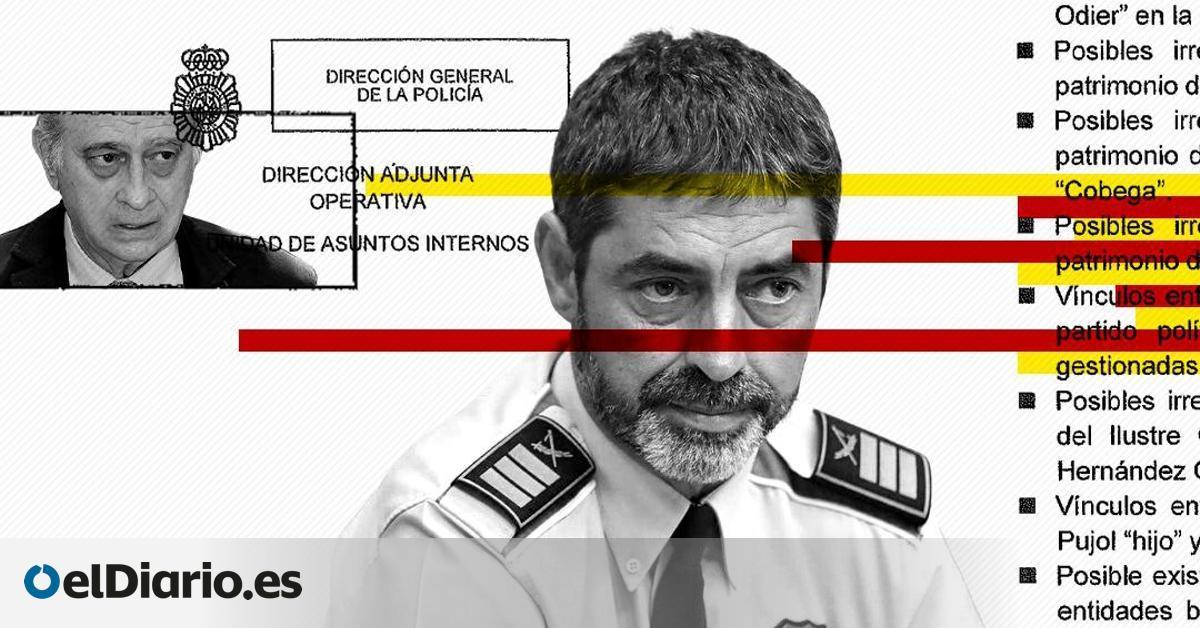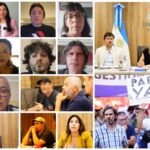
From 2012 to 2016, different police units made blacklists and launched witch hunts against anyone who did not collaborate in the attacks that the Ministry of the Interior of the time orchestrated against Catalan nationalist parties and politicians. Leaders of the Convergència Democràtica de Catalunya (CDC) and Esquerra Republicana de Catalunya (ERC), but also personalities from the world of Justice and law enforcement were persecuted with State money and means. The names of the objectives to be pursued were in the office of the minister, Jorge Fernández Díaz, who, far from disavowing these prospective investigations, prohibited by law, encouraged them and asked to be the first to receive the information.
That whole dirty war left traces in the Ministry of the Interior and the evidence of the political hunt is coming to light through a joint investigation by elDiario.es and La Vanguardia. Several of his victims have learned the details from documents published this week. Among them, who was the top prosecutor of Catalonia, Martín Rodríguez Sol. The one who was head of the prosecutors of Catalonia committed two sins to become persecuted by that political brigade that operated throughout the legislature in Rajoy’s first Government: he defended other formulas other than the referendum to “know the will of the citizens”, always within the legal framework. And he opened proceedings to investigate the publication of a false news item that appeared on the front page of El Mundo that attributed accounts in tax havens to the former president of Catalonia Artur Mas.
Enough. From there it became a target for those police units that operated for at least five years outside the law, without judicial control, to persecute political rivals of the PP. Rodríguez Sol’s man was in a note sent to the minister by the Deputy Operational Directorate, then led by Eugenio Pino, a retired police officer accused in the Kitchen operation and convicted of trying to adulterate the Pujol case. The document does not bear the signature of any head of Internal Affairs and nor is it dated, although the sources consulted place it between the end of 2012 and the beginning of 2016.
It is titled ‘Research Proposal based on information received’. It is not ordered by any judge, it is a political investigation based on rumors or half-truths. In the last paragraph, the document reveals what lies behind what it intends to investigate: “Note: the information received appears for the most part on the Internet and has not been able to be verified so far.”
The police acknowledge in writing that they do not have any solid evidence but ask to deepen these investigations into political and business objectives outside of judicial control. The document bears this heading: “The possible lines of investigation derived from the information received and analyzed by this Internal Affairs Unit of the National Police Corps are summarized below.”
These police units tried to link the head of the prosecutors to the illegal financing of Unió Democràtica de Catalunya. The instructions that Jorge Fernández Díaz had in his hands asked to delve into the “links between the Superior Prosecutor of Catalonia, Martín Rodríguez Sol, and the political party Unió Democràtica de Catalunya and the commissions managed by the lawyers of the aforementioned party.”
Neither then nor now is there any evidence that the prosecutor, who years later appeared on a Unió list of some regional authorities, had any connection with bribes that any party official could receive or illegal commissions resulting from corruption. Asked about the reports of that police mafia, Rodríguez Sol, who continues as a rank-and-file prosecutor in Catalonia, preferred to remain silent.
His dismissal as top prosecutor of Catalonia in 2013 was directly related to those words about the consultation that caused a great scandal in some Madrid media. The conservative Association of Prosecutors (AF), the majority in the race and which was chaired by Rodríguez Sol himself, said it felt “moved” by the file opened by the State Attorney General’s Office that led to Sol’s resignation. The majority of prosecutor associations and judicial authorities considered that the prosecutor’s words should be protected by freedom of expression, but the then attorney general, Eduardo Torres Dulce, appointed by the PP Government, lost confidence in him.
No association of prosecutors has said anything this week about the prospective investigation into Rodríguez Sol, nor statements of condemnation, nor notes of solidarity. Silence.
Trapper, Interior objective
In those same notes in the Ministry of the Interior, Trapero was accused without any evidence of protecting “the Jorodovich family in their drug trafficking issues.” The Jodorovichs are regulars in police operations that implicate their members in drug trafficking, illicit possession of weapons and money laundering.
But where the police pseudo-reports put the most emphasis on Trapero is in relation to the Macedonia case, a macro-case about an alleged drug trafficking plot and its protection by a sub-inspector of the Mossos, which during the past decade caused confrontation between police forces and between Trapero and the investigating judge, Joaquín Aguirre. The case ended in nothing.
The instruction included macrooperations and even a search at the Mossos d’Esquadra headquarters. it was a before and an after. The conviction of the Catalan police and their commander has always been that Judge Aguirre was going after Trapero, although the first suspicions and part of the investigation were carried out by the Internal Affairs Division (DAI) of the Mossos.
With the case already open, there was an attempt by the PP political brigade to use the Macedonia case for its own objectives, far from any attempt to clarify an alleged case of drug trafficking and which included the indictment of Trapero. Something similar happened in the Palau case, when the PP political brigade tried, without success, to take over the cause to organize a search at the Convergència headquarters when there was already sufficient evidence of the party’s corruption (and obtained legally).
In the Macedonia case, Judge Aguirre never charged Trapero, which did not prevent one of the most notorious and public disagreements between a member of the judiciary and a police officer. The major himself explained it at the trial: the judge asked him, orally, to tap the phones of 16 agents from the Civil Guard anti-drug group. Trapero did not see it clearly and asked the instructor for a written order that never arrived. “That meeting has haunted me a lot,” Trapero admitted at the hearing. In these waters he wanted to fish the political brigade of the PP.
The sentence in the case came eleven years later, in September 2022. The years that have passed and a careful examination of the facts and the macro summary (including hundreds of hours of telephone conversations tapped by order of Judge Aguirre) allowed the court to reach several conclusions much colder than the volcanic instruction of the case.
The first, and fundamental, was that there was no protection by the Mossos for the alleged drug network. Nor was it proven that the accused were involved in selling drugs. Of course, the court clarified that it was not unreasonable for Judge Aguirre to think of it as a research hypothesis.
For the court, the main defendant in the case, Manuel GC, was not a drug trafficker but a habitual police informant. He was a key witness in the Mossos investigation against the corruption of National Police commanders in the Riviera and Saratoga brothels, the origin for many members of the Catalan police of the attempted revenge against Trapero in Macedonia given the connections of the convicted persons with the commissioners of the PP political brigade.
Manuel GC’s relationship with the Mossos (he called Trapero more than 200 times in 2010 to request protection) “moves through murky waters,” as described in the sentence, which characterizes the bond between confidants and police, even more so in a time when there was still no clear police protocol on how to interact with these figures.
In 2019, the Mossos sent a report to the judge of the National Court Manuel García Castellón in which, thanks to the audio obtained from the investigation into Commissioner Villarejo and his businesses, they asked to investigate the relationship between the PP political brigade and the Macedonia case. . However, Judge García Castellón refused to open this new line of investigation into the Villarejo case. Trapero announced this week that he will denounce the attempt to discredit him by the PP political brigade.
In the witch hunt against the independence movement, which began five years before the 1-O referendum, there were also businessmen, directors of football clubs and people who were simply passing by. That last list includes one of the country’s great businesswomen, Sol Daurella, president of Coca Cola Europacific Partners, the multinational’s bottling company on several continents. Because she was married to Carles Vilarrubí, historic leader of Convergència, banking executive and archenemy of the controversial Javier De la Rosa, a businessman involved in a thousand corruption cases who pointed out Vilarrubí as one of the front men of the Pujol family, Daurella also appeared in the blacklist of the political police in the Rajoy era.
Neither Trapero nor prosecutor Rodríguez Sol nor Daurella were ever convicted of anything. In the case of Vilarrubí, after De La Rosa tried to implicate him and his office and his home were searched in the presence of Villarejo, he remains accused in a case that investigates the hidden fortune of the Pujols.
Source: www.eldiario.es

